Choosing the right business checking account is a critical step when you open a business. The ideal account provides the essential tools to manage cash flow, process payments, and separate your personal and business accounts without burdening you with high fees.
Whether you’re a new small business or a growing enterprise, finding an account that aligns with your transaction volume, digital needs, and banking preferences is key. This guide explores the top business banking options for 2025 to help you find the perfect financial institution for your needs.
Save 80% of delivery management time
We handle everything:
- Dedicated operations manager
- Real-time tracking dashboard
- Automated customer notifications
- Urgent issue resolution
1. Chase Business Complete Checking
Best for Businesses Needing In-Person Banking
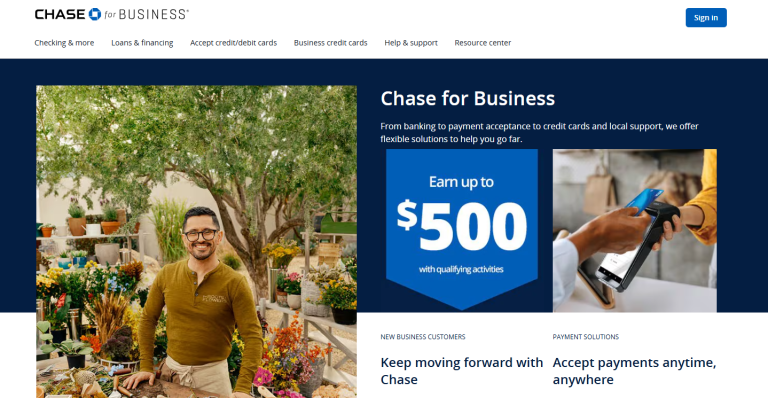
Pros | Cons |
|---|---|
✔️ Extensive branch/ATM network | ❌ $15 monthly fee if not waived |
✔️ Multiple ways to waive the monthly fee | ❌ 20 free in-person transactions (then $0.40/each) |
✔️ Built-in invoicing and card acceptance features | ❌ Low/no interest on checking balances |
This account is a powerhouse for any small business that values the convenience and security of a physical branch. The Chase Business Complete Checking account combines a vast nationwide presence with robust digital tools, offering a well-rounded business banking experience. While it comes with a monthly maintenance fee, there are several achievable ways to have it waived, making it accessible for many small business owners. The account opening process is straightforward, and once you’re set up, the online banking platform and mobile banking app make it easy to manage expenses. However, businesses with high in-person transaction volumes should be mindful of the 20-transaction limit before transaction fees apply per statement cycle.
Why We Chose Chase Business Complete Checking
We chose Chase for its unparalleled blend of digital functionality and physical accessibility. For a small business that still deals with cash or prefers face-to-face support from small business specialists, Chase’s network is a significant advantage. The built-in payment services, including card acceptance, simplify how you manage your cash flow and get paid, providing a comprehensive solution right from the start when you open a business checking account.
Key Features
Waivable Monthly Fee: The monthly fee can be waived by maintaining a minimum daily balance or meeting other qualifying activity criteria.
Large ATM/Branch Network: Access to thousands of branches and ATMs across the country for deposits and withdrawals.
Unlimited Electronic Transactions: Unlimited debit card purchases, Chase ATM transactions, and incoming wires.
Mobile App with Zelle and Invoicing: A feature-rich mobile banking app for payments, mobile check deposits, and creating invoices.
Business Insights and Resource Center: Access to tools and content to help manage and grow your business.
Fees & Other Details
Pricing: $15 per month. This monthly service fee is waivable with a $2,000 minimum daily balance, $2,000 in Chase Ink business credit card purchases, or other qualifying activities.
2. Bluevine Business Checking
Best for High-Yield Interest Earning

Pros | Cons |
|---|---|
✔️ Earn up to 1.5% APY on $250,000 (Premier: 3.70% up to $3M) | ❌ No physical branches |
✔️ Unlimited fee-free transactions | ❌ No out-of-network ATM fee reimbursements |
✔️ No monthly maintenance fee on standard account |
Bluevine redefines what a small business checking account can do by offering a competitive interest rate, making it a leading business interest checking account. For small business owners who maintain a healthy cash reserve, this account turns your working capital into a revenue-generating asset. There is no monthly fee on the standard plan, and you get unlimited transactions, which is a major perk for a growing business. While it’s an online-only financial institution, its integration with accounting software and robust online banking platform ensures you can manage your personal finances and business funds efficiently from anywhere.
Why We Chose Bluevine Business Checking
Bluevine stands out because it allows your business account to function like a high-yield business savings account without sacrificing the liquidity of a checking account. The ability to earn a high APY without a monthly fee is a powerful combination for maximizing your cash flow. This makes it an exceptional choice for digital businesses that don’t require in-person banking services.
Key Features
Fee-Free Checking with No Minimums: No minimum opening deposit, no monthly fee, and no minimum balance required on the standard account.
Competitive APY on Checking: Earn a high interest rate on balances up to a specified limit by meeting monthly activity requirements.
Sign-Up Bonus: Offers an attractive welcome bonus for opening a new business checking account.
Unlimited Digital Transfers: No limits on the number of transactions, including ACH, bill pay, and mobile check deposits.
FDIC-Insured: Deposits are Member FDIC insured up to the standard limit through Coastal Community Bank.
Fees & Other Details
Pricing: $0 per month for the standard plan. The Premier plan is $95 per month, which is waivable with a $100,000 average daily balance and $5,000 in spending on your business debit card.
3. Axos Bank Basic Business Checking
Best for Fee-Free Online Banking
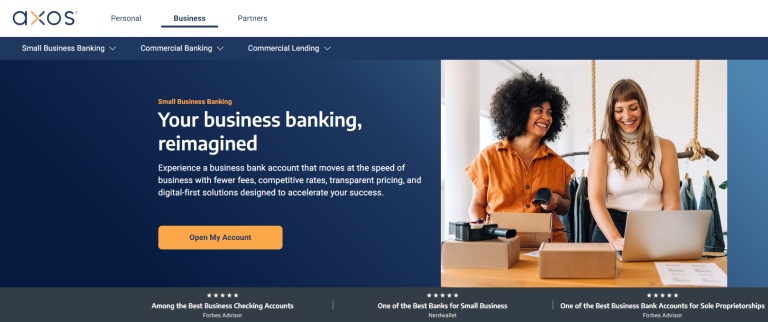
Pros | Cons |
|---|---|
✔️ Unlimited item processing (debits, credits, deposited items) | ❌ No physical branches |
✔️ Unlimited ATM fee reimbursements | ❌ Some features best for digital businesses |
✔️ Up to $400 welcome bonus |
The Axos Bank Basic Business Checking account is an excellent choice for any small business looking to eliminate bank fees entirely. As a truly free basic business checking account, it charges no maintenance fee and has no minimum balance requirements. Its standout feature is the unlimited reimbursement of domestic ATM fees, giving you the freedom to use any ATM nationwide without penalty. This is a significant benefit for business owners who need access to cash but don’t want to be tied to a specific ATM network. The account opening process is entirely online, and it provides all the essential tools you need to run your business finances.
Why We Chose Axos Bank Basic Business Checking
We selected Axos Bank for its commitment to a truly fee-free experience. The combination of no monthly fee, no minimum deposit, and unlimited ATM rebates makes it one of the most cost-effective eligible business checking accounts available. It’s a perfect match for a new business that needs to keep overhead low while still enjoying premium features like unlimited transactions and free incoming wires.
Key Features
Unlimited Domestic ATM Rebates: Get all your domestic ATM fees reimbursed, offering unparalleled flexibility.
No Maintenance or Minimum Balance Fees: A genuinely free business account with no strings attached.
Free Domestic Incoming Wires: Save money on receiving payments from clients and partners.
QuickBooks Compatibility: Easily sync your transactions with popular accounting software to streamline bookkeeping.
No Minimum Deposit: Open a business checking account with any amount you choose.
Fees & Other Details
Pricing: $0 per month. There is no minimum opening deposit or ongoing balance requirement.
4. American Express Business Checking
Best for American Express Cardholders
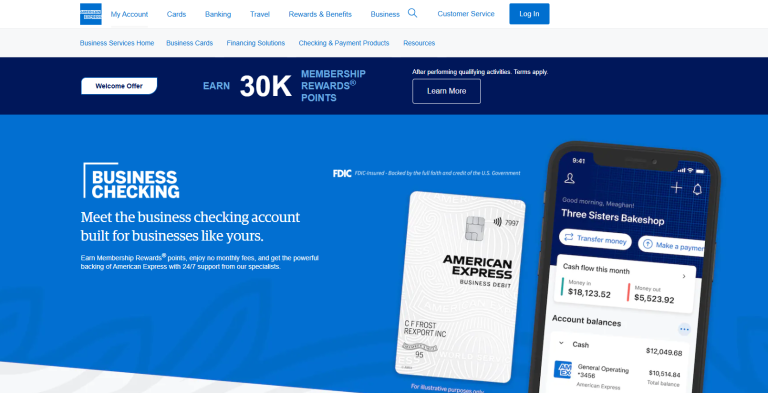
Pros | Cons |
|---|---|
✔️ 1.3% APY on balances up to $500,000 | ❌ No cash deposit option |
✔️ No domestic/international wire or insufficient funds fees | ❌ No physical branches |
✔️ Access to large ATM networks | ❌ Fewer extra business lending products |
American Express extends its trusted brand into the business banking space with a compelling digital checking account. This business account is particularly attractive for existing American Express customers, as it integrates seamlessly into the Amex ecosystem. It offers a very competitive 1.3% APY, allowing you to earn on your balance. A major differentiator is the absence of fees for wires, a significant cost savings for businesses that transact globally. While it lacks a physical presence and a way to make free cash deposits, its powerful digital platform, combined with fee-free transactions and Membership Rewards points on debit card purchases, makes it a top-tier choice.
Why We Chose American Express Business Checking
The synergy with the broader American Express business program makes this a standout choice. For business owners already using an Amex business credit card, this account centralizes financial management and maximizes rewards. The high-yield APY and no-fee structure on many common transactions offer substantial value, making it easier to manage expenses and grow your capital.
Key Features
Unlimited Free Transactions: No limits on electronic payments, mobile check deposits, or bill pay.
Large ATM Network Access: Use your business debit card at over 70,000 MoneyPass and AllPoint ATMs for free.
No Minimum Opening Deposit: Start with any amount, with no ongoing balance requirements to avoid a monthly fee.
FDIC-Insured: Your business deposit is secure and Member FDIC insured.
24/7 Support: Access to American Express’s renowned customer service anytime.
Fees & Other Details
Pricing: $0 per month. No annual fee or monthly service fee.
5. U.S. Bank Business Essentials Checking
Best for Businesses In Its Service Area
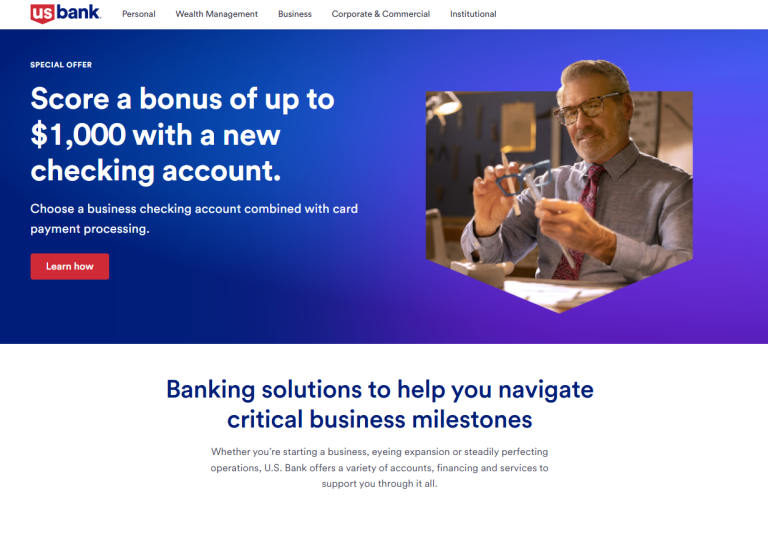
Pros | Cons |
|---|---|
✔️ No monthly service fee | ❌ Limited physical footprint outside regional states |
✔️ Wide branch/ATM access (in 26 states) | ❌ Some bonuses require large balances or activity |
✔️ Strong business credit card offerings |
U.S. Bank offers a solid hybrid model with its Business Essentials Checking account (previously known as Silver Business Checking). This account is especially beneficial for a small business operating within U.S. Bank’s 26-state footprint, as it provides both a robust online banking experience and access to physical branches. The online-only version of the account has no monthly service fee, making it a cost-effective choice. It includes a generous number of free transactions per statement cycle, making it suitable for businesses with moderate activity. The ability to pair this account with a strong business credit card and other financial products makes U.S. Bank a convenient, all-in-one financial institution.
Why We Chose U.S. Bank Business Essentials Checking
U.S. Bank provides the best of both worlds for businesses in its service area: the convenience of a modern digital platform and the reassurance of in-person support from small business specialists. Waiving the monthly fee for the online account makes it competitive with online-only banks, while its branch network gives it an edge for businesses that still need traditional banking services like a business deposit.
Key Features
Unlimited Digital Transactions: Enjoy unlimited electronic transactions through the mobile banking app and online portal.
Free In-Person Items: Get 25 free teller and paper items each month, with a small fee thereafter.
Welcome Bonus: Opportunity to earn up to a $400 bonus with qualifying activities.
Wide ATM/Branch Network: Access to a large network of branches and ATMs in 26 states.
Comprehensive Business Solutions: Access to small business loans, credit cards, and merchant services.
Fees & Other Details
Pricing: $0 per month for the online account.
6. NBKC Business Checking
Best for No-Frills Fee-Free Checking
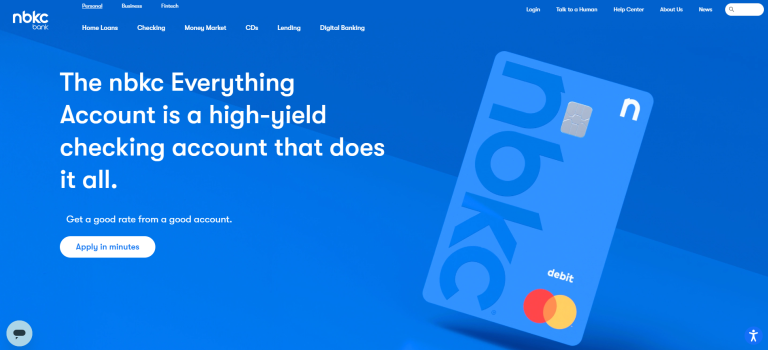
Pros | Cons |
|---|---|
✔️ No overdraft or nonsufficient funds fees | ❌ Only local Kansas City branches |
✔️ Free domestic incoming wires and low outgoing fees | ❌ Limited business lending products |
✔️ Unlimited transactions |
NBKC’s Business Checking account is the epitome of simplicity and transparency. It’s designed for the small business owner who wants a straightforward, dependable account without worrying about surprise charges. There are no monthly maintenance fees, no minimum balance requirements, no transaction fees, and no overdraft fees. This focus on eliminating common banking fees can save a business a significant amount of money over time.
Why We Chose NBKC Business Checking
NBKC is our pick for its unwavering commitment to a fee-free experience. For a new business checking account, this simplicity is invaluable. It strips away the complexity and hidden costs often associated with business banking, allowing you to focus on your operations, not on avoiding a maintenance fee. The inclusion of free domestic wires and bill pay adds even more value to this already cost-effective account.
Key Features
$0 Minimum Deposit and No Monthly Fees: Open an account with no money down and never pay a monthly fee.
Free Mobile Banking: A modern mobile banking app to manage your account, including mobile check deposits and a digital wallet.
FDIC Insured: Your funds are protected by FDIC insurance.
Fees & Other Details
Pricing: $0 per month.
7. Relay Business Checking
Best for Businesses With Multiple Users

Pros | Cons |
|---|---|
✔️ No account or overdraft fees | ❌ No lending/loan products |
✔️ Unlimited accounts (up to 20) and user permissions | ❌ Check hold times up to 6–7 days |
✔️ Free incoming wires and transactions | ❌ No physical branches |
Relay offers a unique and powerful approach to business banking, especially for teams. Its standout feature is the ability to open up to 20 individual, no-fee business checking accounts under one umbrella. This allows for meticulous cash flow management, such as separating funds for payroll, taxes, and operating expenses. Furthermore, Relay provides granular user permissions and the ability to issue up to 50 physical or virtual business debit cards, making it easy to delegate financial responsibilities while maintaining control. Unlike a more traditional offering like a Truist business checking account, Relay is built from the ground up for collaborative, digital-first teams.
Why We Chose Relay Business Checking
Relay was chosen for its exceptional cash management and team collaboration tools. No other provider makes it this easy to create multiple sub-accounts and manage user permissions without any account fees. This functionality is a game-changer for businesses that need to track different revenue streams or empower team members to manage expenses responsibly. The seamless integrations with accounting software like QuickBooks Online and Xero further enhance its utility.
Key Features
High-Yield Savings: Earn up to a 3.03% APY on idle cash with a Relay Pro savings account.
Multi-User Access & Spend Controls: Invite team members and set specific permissions for each user and card.
Advanced Cash Management: Open multiple checking and savings accounts to organize your finances.
Built-in Integrations: Connects directly with major accounting software, payroll systems, and payment services.
Unlimited Transactions: No fees for ACH transfers, incoming wires, or other transactions.
Fees & Other Details
Pricing: $0 per month for the standard plan. Relay Pro, which includes features like free outgoing wires and next business day funding for ACH, has a monthly fee.
8. Rho Business Checking
Best for High-Volume Digital Businesses

Pros | Cons |
|---|---|
✔️ Unlimited free ACH and wire transfers | ❌ No debit card/ATM access |
✔️ Enhanced FDIC coverage | ❌ Must use as main bank for max bonus |
✔️ Large bonus for new business customers | ❌ Some setup requirements may be complex |
Rho is a sophisticated financial platform built for modern, high-growth companies. It goes beyond a basic business checking account, offering an integrated system for corporate spending, accounts payable, and treasury management. One of its most compelling features is unlimited free ACH and wire transfers, which can result in massive savings for businesses with high transaction volumes. Its enhanced FDIC insurance coverage, which can protect up to $75 million, provides peace of mind for well-capitalized companies. Rho’s platform is designed for efficiency, with features like built-in bill pay and real-time expense tracking to streamline financial operations.
Why We Chose Rho Business Checking
Rho is our choice for high-volume digital businesses due to its focus on eliminating transaction fees and providing scalable financial tools. The lack of a business debit card or ATM access is a deliberate choice, positioning Rho as a pure B2B payment services platform. For a business that primarily moves money digitally via ACH and wires, the cost savings and operational efficiencies offered by Rho are unmatched.
Key Features
Unlimited Free ACH and Wire Transfers: No fees on any domestic or international wire transfers.
Mobile-First Platform: Manage corporate cards, pay bills, and track spending from a powerful mobile app.
FDIC Coverage up to $75 Million: Enhanced insurance through a network of partner banks.
Built-in Bill Payment/Invoicing: Automate your accounts payable process directly within the platform.
Real-Time Expense Tracking: Get instant visibility into company spending with integrated corporate cards.
Fees & Other Details
Pricing: $0 per month. The platform is free to use, with revenue generated from interchange fees.
9. Bank of America Business Advantage Checking
Best for Integrated Business Banking Services
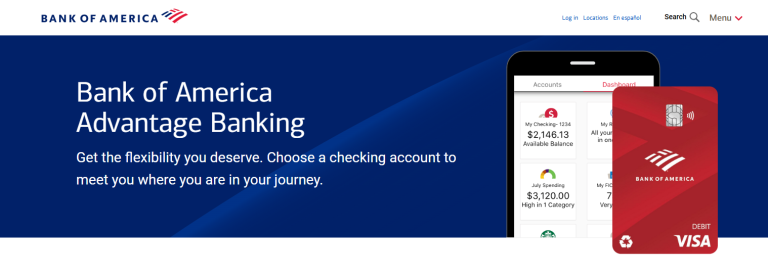
Pros | Cons |
|---|---|
✔️ Multiple waivable monthly fee options | ❌ Monthly fee without qualifying balance/activity |
✔️ Integrations with major business platforms | ❌ Branch hours may be limited |
✔️ National branch access |
Bank of America offers a comprehensive suite of products centered around its Business Advantage Relationship Banking model. The Business Advantage Fundamentals checking account is a solid starting point for many small businesses. It offers access to a massive national network of branches and ATMs, robust mobile banking, and seamless integrations with tools like QuickBooks and Zelle.
The monthly fee is waivable through several methods, including maintaining a qualifying average daily balance or spending on a linked business credit card. For businesses that grow, the Preferred Rewards for Business program offers significant benefits, such as interest rate discounts on small business loans and fee waivers, similar to member-focused perks at institutions like the Navy Federal Credit Union.
Why We Chose Bank of America Business Advantage Checking
This account is an excellent choice for businesses seeking a deep, integrated relationship with a single financial institution. The Business Advantage Relationship Banking program is designed to reward you as your business grows and you use more of the bank’s services, from a business savings account and merchant services to seeking credit approval for a loan. This holistic approach, combined with a strong physical and digital presence, makes it a reliable partner for the entire lifecycle of a business.
Key Features
Multiple Checking Account Types: Choose from Business Advantage Fundamentals or Relationship Banking accounts to fit your needs.
Seamless Integrations: Connects easily with QuickBooks, Zelle, Bill Pay, and the bank’s own merchant services.
Business Rewards and Financing: Access to a full suite of business financing, including credit cards and small business loans with potential interest rate discounts.
Extensive Small Business Support: A wealth of resources, tools, and small business specialists available online and in branches.
Mobile Banking with Robust Digital Features: Manage your business account, pay bills, and deposit checks on the go.
Fees & Other Details
Pricing: The Business Advantage Fundamentals account has a $16 monthly fee, waivable with a $5,000 combined average daily balance, $500 in new qualifying debit card purchases, or by becoming a Preferred Rewards for Business member.
Of course. Here is the comprehensively written content for the requested sections.
What to Look for in a New Business Checking Account
Choosing the right small business checking account is a foundational decision that extends far beyond simply having a place to store your capital. The features of your chosen account will directly influence your daily financial operations and long-term profitability. At the forefront of considerations should be the fee structure. Look for an account with a low or, ideally, a non-existent monthly maintenance fee.
Many financial institutions offer ways to waive this monthly service fee, often by maintaining a minimum average daily balance, making a certain number of debit card purchases per statement cycle, or linking other eligible accounts. Beyond this, you must scrutinize the policy on transaction fees. A basic business checking account might offer a limited number of free transactions before charging per item, which can quickly become costly for businesses with high sales volume. Understanding transaction fees is essential for managing your business expenses effectively. Transaction fees can vary significantly between banks and account types, often including charges for deposits, withdrawals, transfers, and additional services. To learn how these fees impact small businesses and discover practical tips to minimize them, visit our detailed guide on handling transaction charges.
In today’s digital economy, robust technological tools are not a luxury but a necessity. A superior online banking platform and a seamless mobile banking app are critical for managing your finances on the go. These platforms should provide essential functions like mobile check deposits, easy bill pay, and integration with a digital wallet for convenient payments. Furthermore, consider how well the account integrates with your existing accounting software.
A direct connection can automate bookkeeping, provide real-time insights into your cash flow, and significantly reduce the administrative burden of running your small business. Finally, look for an account that can grow with you, offering easy access to related products like a high-yield business savings account, a reliable business credit card, and in-house merchant services to streamline payment processing from customers.
Opening Your New Business Checking Account
The process to open a business checking account is a well-defined procedure that formalizes your company’s financial identity. The first step involves thorough research to select the financial institution that best aligns with your business model. Once you have made your choice, you must gather the required legal documentation.
The specific documents will depend on your business structure, but you will generally need your personal identification, your business formation papers such as your Articles of Incorporation or LLC operating agreement, and your federal Taxpayer Identification Number (TIN), also known as an Employer Identification Number (EIN). This documentation is critical for verifying your business’s legitimacy and complying with federal regulations designed to prevent financial fraud, often verified through systems like Early Warning Services.
With your documents in hand, you can proceed with the account opening itself. Many modern banks allow you to complete the entire application to open the account online, a process that is often faster and more convenient. Alternatively, visiting a physical branch allows you to consult with small business specialists who can answer specific questions and guide you through the options.
You will likely need to make a minimum opening deposit to activate the account, though an increasing number of online-focused banks have eliminated this requirement. After your application is approved and funded, you will receive your business debit card, gain access to the online banking portal, and can begin the important work of separating your business finances from your personal ones.
Credit Union Membership Rewards for a Small Business
When considering where to open a business account, many entrepreneurs overlook credit unions, yet they can offer a compelling alternative to traditional banks. Unlike for-profit banks, credit unions are not-for-profit cooperatives owned by their members. This fundamental difference means that as a business member, you share in the institution’s success, which often translates into tangible benefits.
These advantages can include significantly lower fees on checking accounts, a reduced annual fee on credit products, higher interest rates on a connected business savings account, and more favorable terms when you seek credit approval for small business loans. An institution like Navy Federal Credit Union, for example, is renowned for its member-focused approach and extensive membership rewards.
However, it is important to consider the complete picture. Credit unions typically have membership eligibility requirements, which might restrict access based on your location, profession, or affiliation with certain organizations. While their personalized customer service is often a major draw, their physical branch and ATM networks may be less extensive than those of large national banks.
Their investment in technology, such as the mobile banking app or advanced payment services, might also vary. For a small business, the decision comes down to a trade-off: the potential for superior service and lower costs at a credit union versus the broader accessibility and potentially more sophisticated digital tools of a larger financial institution.
Business Checking Account vs. Personal Checking Account
One of the most critical principles for any entrepreneur is maintaining a strict separation between business and personal finances, a core reason to move beyond a personal bank account for your company’s transactions. Using a single account for both purposes, a practice known as commingling funds, can create a cascade of legal and accounting problems.
From a legal standpoint, it can pierce the “corporate veil,” a legal doctrine that separates you from your business. If your business is sued, this could put your personal assets—your home, car, and personal savings—at risk. A dedicated business account, even a basic business checking account like a Business Advantage Fundamentals product, solidifies this protective barrier.
Operationally, separating accounts is essential for clarity and growth. It allows you to accurately track your company’s cash flow, monitor profitability, and effectively manage expenses without the noise of personal spending. This financial clarity is indispensable during tax season, simplifying the process and reducing the risk of an audit. Furthermore, establishing a history with a business checking account is the first step toward building a credit profile for your business.
This history is a key factor that lenders review when you seek credit approval for a business credit card or small business loans, which are often crucial for funding expansion and managing working capital. Understanding the fundamentals of accounting, such as how debits and credits work in small business bookkeeping, can greatly enhance your ability to manage your business checking account effectively. This knowledge not only ensures accurate record keeping but also helps in reconciling accounts and preparing financial statements, which are essential for tracking your business’s financial health and preparing for tax season.
Why Trust Our Review of Business Checking Accounts
Our mission is to empower small business owners with clear, actionable insights, and our review process is built on a foundation of comprehensive and objective analysis. To identify the best options, we examined dozens of eligible business checking accounts from a wide range of financial institutions.
Our evaluation of each basic business checking account began with a meticulous analysis of its fee structure. We scrutinized the monthly fee, the requirements to have the maintenance fee waived, the cost of transaction fees after free limits are exceeded, and the fees for essential services like incoming and outgoing wires.
Beyond the numbers, we conducted a qualitative assessment of the digital user experience. We evaluated the functionality and ease of use of each institution’s online banking platform and mobile banking app, testing critical features like mobile check deposits and bill pay.
We also considered the ecosystem of related products, including the terms of any associated business savings account, the benefits of a linked business credit card, and the integration of merchant account and payment services. This multi-faceted approach ensures our recommendations reflect the real-world needs of a small business, balancing cost, convenience, and the potential for a long-term, supportive business banking relationship.
Frequently Asked Questions (FAQs)
What is the primary purpose of opening a small business checking account instead of using a personal one?
A small business checking account is crucial for legally separating business and personal finances, which protects personal assets, simplifies bookkeeping and tax preparation, and establishes a financial history for the business.
What is the difference between a business checking account and a business savings account?
A business checking account is designed for daily transactions like deposits, withdrawals, and payments, while a business savings account is for holding cash reserves to earn interest, making it ideal for managing long-term savings or emergency funds.
When I open a basic business checking account, what are the most common fees to look out for?
Common fees include a monthly maintenance fee (often waivable), transaction fees for exceeding a monthly limit, wire transfer fees, and out-of-network ATM charges.
For accounts like the Business Advantage Fundamentals, what common fees should a business owner look out for?
Common fees to look out for include a monthly maintenance fee (which is often waivable), transaction fees for exceeding a monthly limit, wire transfer fees, and out-of-network ATM charges.
Why is it important to separate personal finances from business funds?
Separating personal finances is legally important for maintaining liability protection (the “corporate veil”). Operationally, it allows for accurate tracking of business cash flow, profitability, and expenses, which is essential for financial clarity and growth.
What is a merchant account, and how does it relate to a business checking account?
A merchant account is a specific type of bank account that allows a business to accept and process credit and debit card payments from customers. While separate, it works in conjunction with your business checking account, as the processed funds are ultimately deposited there.
Finding the Right Financial Partner for Your Business
As we’ve explored, the ideal business checking account is not a one-size-fits-all solution. The best choice for your company hinges on your unique operational model, transaction volume, and growth strategy. For some small business owners, the convenience of a vast ATM network and in-person support is paramount, while for others, a high-yield online account with a feature-rich mobile banking app and zero monthly fees is the smarter path. Before making a decision, carefully weigh the importance of features like seamless integration with your accounting software, the utility of a versatile business debit card, and the potential need for future services like a business credit card or merchant services. When evaluating accounts, understanding how the average daily balance influences fee waivers and interest calculations is crucial. Many banks require maintaining a certain average daily balance to waive monthly fees or earn interest. This metric calculates your average balance each day over a billing cycle, impacting both your fees and earnings. Familiarizing yourself with how this balance is calculated can help you better manage your account and avoid unexpected charges.
Your journey begins with the account opening process, but the relationship with your chosen financial institution is a long-term partnership. Consider your five-year plan: will you eventually need access to small business loans or a more comprehensive package like a Business Advantage Relationship Banking program? While you may be using a personal bank account for now, transitioning to a dedicated business account is a crucial step towards professionalizing your operations.
The options are diverse, from major national players to digital-first innovators, each offering a different value proposition than you might find at, for example, a Truist business checking account or a member-focused institution like Navy Federal Credit Union. Use this guide as your starting point to find the perfect financial foundation that will help your business thrive. For those looking to broaden their research, consider exploring a detailed review of the best banks for small business to compare offerings from a wide range of financial institutions, including emerging digital banks and traditional branch-based providers. This resource provides up-to-date insights into fees, features, customer service, and specialized products designed to support small business growth in 2025.














